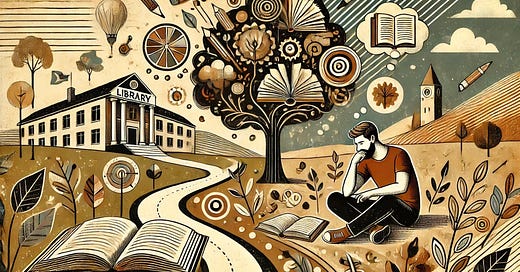Do you think that reading about literature can make reading and writing less interesting? I’m talking about reading books like How to Read Literature by Terry Eagleton, Reading Like a Writer by Francine Prose, and How to Read a Book by Mortimer J. Adler and Charles Van Doren, just to name a few.
Honestly, my reading and writing changed a lot after I’ve read books like these—and books on writing, too. Not only do I understand more about the essence, style, and context of literary works now, but I also recognize the references and influences of various authors. This, in my opinion, enriched my experience in both areas a lot, and it significantly improved my close reading skills. It also taught me that there’s a long road never to be finished about this topic.
However, I can see a potential problem there. You might see it too.
By ”dissecting the frog,” you can sometimes spoil the pleasure of discovery. If you are sure you know what’s inside, what’s the point in even opening the book? Aren’t all stories the same, if you think about it? And what am I writing? Isn’t it just a patchwork of everything I’ve read?
I had a literature teacher a long time ago, a brilliant mind, a little affected but a genius. He knew everything about Portuguese and Brazilian literature. I asked him once if he ever thought about writing something of his own. He told me he read and studied literature so much that he couldn’t even try to write anything without ”despising it”—that’s what he said—for not being even close to the masters he admired and knew so much about.
Well, that can be true or not. It depends on your perspective.
You see, as readers, we can become picky and arrogant about books and stories, perhaps a little less open to a certain kind of literature. As writers, we might set the bar too high or restrain ourselves to an unconscious mimicking of literature masters or even a forced distancing of that—aiming for originality—, making the whole craft more difficult than it should be.
But there’s always something we don’t know yet and always something nobody told the way we will tell. We can always find something new, entertaining, different, interesting, or at least educational in what we read. And we can always express our unique views and emotions in the stories we write, forgetting—just for a while—what other authors did in the past.
The only alternative I see to fight the boredom or self-consciousness resulting from dissecting the literary frog is to embrace a mindset that allows us to switch off the editor or critic mode in our brains and just enjoy reading and writing in its pure form as if everything there was new to us.
Then—well, if we want to go there—we can use all that knowledge on the craft and art to edit, review, and critique, but always aiming for a positive outcome.
In that situation, learning more can be beneficial after all. We stop being amazed because we’re ignorant and we get amazed by the genius of certain writers. We stop looking for perfect writing and we embrace the simple act of putting down in words what we feel and think.
So, in the end, it’s all about balance. As usual. We can use what we learn without letting it ruin the simple joy of reading and writing. We can also start thinking for ourselves and deciding what we agree with and what we don’t and start creating our own set of ideas and beliefs. We can put more of us in what we write, instead of trying to be… perfect.
After I heard my teacher saying what he said, I decided I would never be like him, and I would like to encourage you to do the same.
Now, in my previous post, I said I was reading HOW TO READ LITERATURE by Terry Eagleton to improve my posts here on Substack. So far, I believe that what I’m learning is that the only way to be valuable to you, as my reader, is to do exactly what I’m saying here. Not to focus much on the technicalities of books and stories, like narrative, plot, characters, and style, but just put down in words what I feel and think about what I read and what I write.
Do you agree? Tell me in the comments.
TL;DR: Reading books about literature theories can enhance your understanding and appreciation of literary works, but it can also risk overanalyzing and losing the joy of reading and writing. The key is to balance learning with enjoyment, allowing yourself to switch off the critic mode and embrace your unique voice and creativity.





I somewhat agree, but not fully. I certainly think we can enjoy literature without over-dissecting it. Even as an English Teacher, it's not like I'm thinking about the layers of symbolism as I lay in bed reading at night.
However, I think new meaning can be uncovered through deep analysis, and there is beauty in this too. When teaching, I often describe this process in terms of ice cream sundaes (or other delicious, layered foods - nachos, trifle, lasagna, etc.). Sure, we could just enjoy the "top layer," but the deeper we dig, the more we get to taste, and the best stiff is often at the bottom.